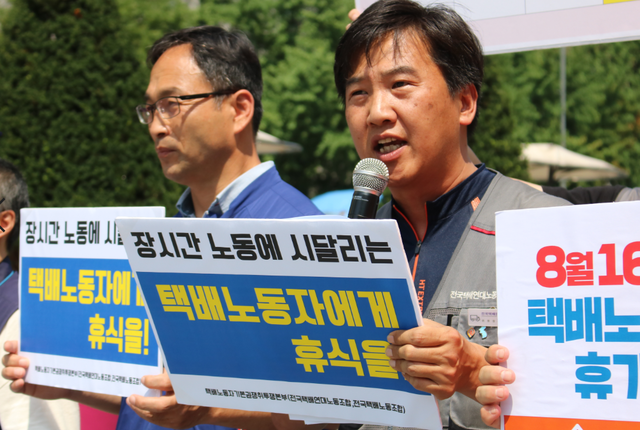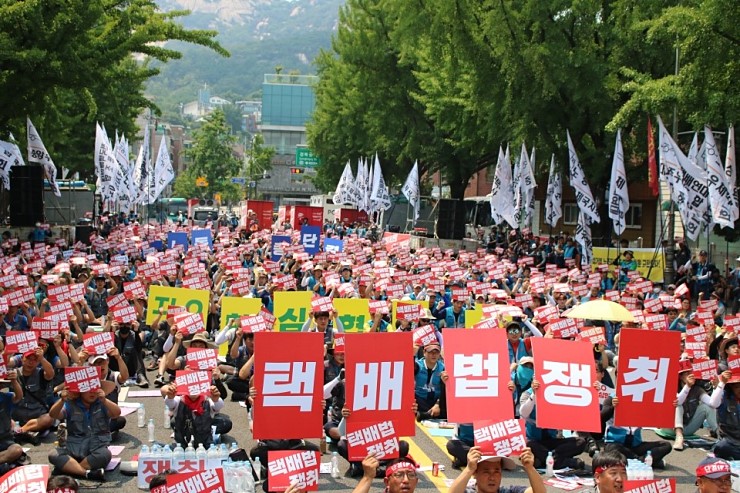The delivery market in Korea has been growing rapidly as more people shop online. The number of deliveries per year has surpassed 2.5 billion units in Korea and this number is expected to continue to increase. The quality and speed of delivery services has improved along with the rising consumer demand. However, as the market for shipped items grows, workers in delivery services are being overworked as their working conditions continue to deteriorate. Most delivery people are hired as work part timers and are therefore classified as special employees. This special categorization means that the 52 hour work week policy and the 3 major labor rights laws are not guaranteed to cover delivery service workers.
In addition to regular long working hours, demand for delivery services increases during the holiday season. From Chuseok through the fall harvest season, the "kimchi-making season" and Christmas, right up until New Year's Day, delivery people are rushed to keep up with their demand. According to a survey by the Seoul Labor Rights Center, delivery people worked an average of 74 hours per week in 2017. Their working hours are 18 hours longer than that of postmen, who work on average 55.8 hours per week. Unlike ordinary workers, deliverymen are not recognized as “laborers” under the law because they receive a commission for every delivery instead of regular wages. Deliverymen start work around 7 am sorting out the items they need to ship. They are paid about 700 won per delivery, but earn little or no pay for the early morning sorting work of their deliveries. This means that at the end of the day, they are paid less than the minimum hourly wage rate. Employers do not have to pay delivery workers who come in early to sort their shipments because they are classified under the law as special workers.
 |
| ▲ The labor unions of delivery service are participating in a rally to improve their working environment. (Photo from Taekbae union) |
Workers who are in charge of sorting deliveries fall under the "Labor Standards Law" and should be paid a minimum hourly wage or higher. However, many employers argue that it’s a waste of money, especially when they are already trying to cut down the number of workers who sort products for delivery. This approach is the main reason why the treatment of delivery workers has not improved so far.
To take on these injustices, deliverymen launched ‘More Hope’, a labor union established to protect deliverymen’s fundamental labor rights. In a show of strength, on September 5, in front of Sewol Square in Gwanghwamun, ‘More Hope’ held a press conference, calling for improved working conditions for deliverymen. Regardless of their form of employment or affiliated companies, almost all labor unions representing delivery workers pledged continuous joint efforts in support of the rights of deliverymen.
Not only delivery workers, but also couriers and cargo truck workers have struggled to enhance their working conditions, including wage increases and shorter working hours. 'More Hope' has said it will work to improve the working conditions of all workers in delivery services calling for improvements to labor rights. Moreover, they pointed out that "The pain of deliverymen is growing continually because they are overworked while delivery companies are avoiding their responsibility to treat them properly.
To dive deeper into the problems of deliverymen in Korea, The Dankook Herald interviewed Kim Jin-il, Director of Taekbae Union, which is a labor union of deliverymen in Korea. They’re constantly striving to improve the working conditions of deliverymen and guarantee their right to be protected as legal workers under the law. Kim explained that deliverymen are classified as special workers because they receive a commission per delivery, instead of wages. Article 2 of the Labor Standards Act of Korea, covers workers who are people working for a company for the purpose of receiving wages, regardless of their occupational category. Since deliverymen don’t receive wages, but rather receive a commission for services, they are classified as specialized workers enabling companies to take advantage of the loose definition under the law and refuse to pay employees for their working hours. He also stated that the parcel classification system should be improved to save workers time and trouble. He called on the National Assembly to pass a Delivery Service Industry Development Act to improve the working conditions of deliverymen across the nation. Kim also called on the government to change the definition of “workers” under the Labor Standards Act, so that deliverymen are clearly protected.
Being overworked, life-threatening accidents due to fatigue, low wages and a shortage of delivery workers overall causes both physical and psychological pain to industry employees. To improve the working environment for deliverymen, courier service companies must change the current wage system and invest in improving their product sorting systems. Specifically, employers need to give their workers a standard monthly pay or hourly wages instead of working off commission based deliveries. Then, delivery workers would be recognized as legal workers and their rights as a worker will be respected according to the Labor Standards Act. Our society needs to pay attention to this growing problem and find a solution that makes their lives more humane and hopeful.
 |
| ▲ Delivery workers who suffer from excessive labor are requesting for a break in August. (Photo from Newdaily) |
남윤경, 박근후, 서채원 dankookherald@gmail.com

 Vote for the Campus Brand Naming!
Vote for the Campus Brand Naming!

![[Campus Magnifier] Let's Surf the Library!](/news/thumbnail/202404/12496_1765_4143_v150.jpg)




